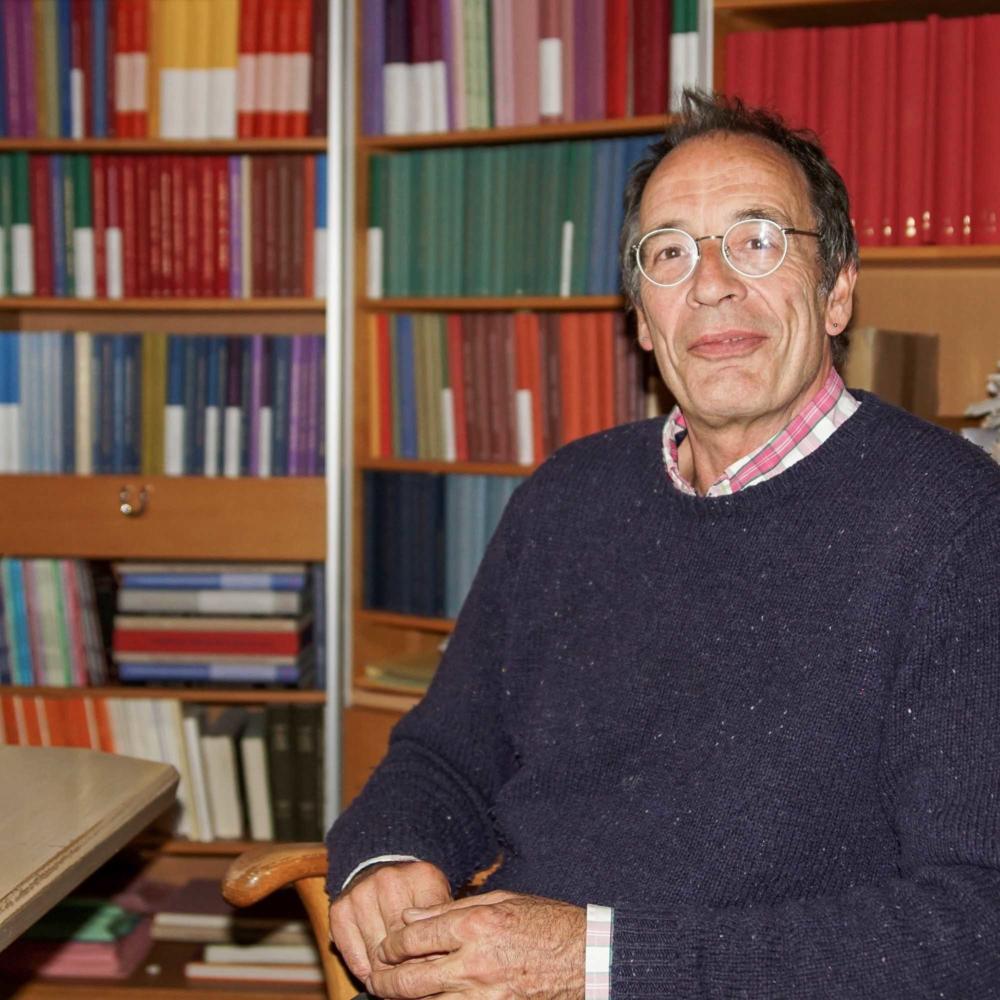A world without art becomes sclerotic
Bronze, stone, wood – sculptor Rik Ten Cate is familiar with all these materials. And he is at home in the social realm – as a husband, father of four, teacher and arts lecturer. He became a council member of the Dutch Society in 2014, and its General Secretary this April.
Sebastian Jüngel How were you approached about becoming General Secretary?
Rik ten Cate This happened in a council meeting in the autumn of 2018. We were talking about the fact that our tenure would end after five years. Three people intended to stop serving, including Jaap Sijmons. He suggested I should become his successor.
Jüngel How did you feel about that?
Ten Cate When I asked him «Why me?» he mentioned my rigorous anthroposophical path as teacher and lecturer, and my work for the Arts Section in the Netherlands and in Dornach, as well as my many connections at the Goetheanum and worldwide. I thought «That much is true». I also reflected that there would be others who could be considered, but not all of those would be able to travel as frequently. I wouldn’t necessarily apply for this position, but I can embrace it.
Jüngel In which way is Jaap Sijmons a role model for you?
Ten Cate He is a scientist, a lawyer and a philosophy graduate. He has immersed himself in studies of Christian Rosenkreutz and the 12 worldviews. He knows the 1923/1924 Society Statutes inside out. I admire his readiness to take responsibility, and to stand up for his convictions.
Successful outcomes but neglect of the source
Jüngel What impulses do you bring to the Anthroposophical Society?
Ten Cate Five years ago we had a disastrous situation within the Society in the Netherlands: some members experienced the election of a new Council almost as a kind of coup. It took some time to regain their trust. I feel we are standing on firmer ground now. But we are already looking back on the first 20 years of the twenty-first century. Just think what Rudolf Steiner managed to achieve in that timespan! Of course, anthroposophical initiatives are thriving in the world: the Dutch Waldorf schools have long waiting lists, organic food is experiencing a boom, Triodos Bank has more money than it can invest. There is interest in the effects of anthroposophy, but where is the interest in the Anthroposophical Society, in maintaining the flow from the source from which all that has come? We have to work on becoming a modern and contemporary Society, not authoritative, knowing everything better, not by distancing ourselves from the work in other Sections. We also need to focus on specifically Dutch problems, such as the current ban on anthroposophical medicines.
Openness and honesty – respect for higher beings
Jüngel Through the School of Michael we have ties to the spiritual world. Its requirements have to flow pragmatically into our earthly tasks. How do you deal with this dynamic as a council member?
Ten Cate I experience myself as a child of the Michaelic stream. Michael demands transparency and honesty. Nothing can be covered up, all must become visible. Anything we hide connects itself with the beings of the shadows – we really don’t need that. Living in the light gives you enough problems already.
We need to take careful note of the things you mention: Does what we do respect and value the being Anthroposophia appropriately? Is it harmed – really harmed? Are we doing justice to the high values represented in the Goetheanum’s forms, its windows, the images on the ceiling? They need our protection. But the real mystery lies not in the words but in the attitude out of which they are spoken.
Jüngel What can the world learn from the Netherlands?
Ten Cate Wind and water bring valuable gifts: flexibility, clarity, humour – also singing and dancing. Rudolf Steiner referred to the cosmopolitan aspects.
Jüngel What can the Netherlands learn from the world?
Ten Cate For one, the ability to absorb solemn, deep contents (there are of course many who do this already). By this I mean that we mustn’t forget what spiritual science wants, and that elevated spiritual beings have associated themselves with it. There may be many cultures in the Netherlands – but we need to recognize that there is also anthroposophy in Iceland or Russia, for example, and that it appears and is received differently there. At the meeting of international representatives I noticed that many non-European countries are represented by Europeans. On a personal-emotional level that isn’t a problem, I feel, but the thinking has to become more international.
Developing levity
Jüngel How would you respond if a TV station asked you to characterize anthroposophy in 90 seconds?
Ten Cate I would base my answer on the first Leading Thought: «Anthroposophy connects the spiritual in the human being to the spiritual in the cosmos.» This means that it works in the knowledge and consciousness that there is both a physical world and a spiritual world with spiritual beings. This forms the basis for the esoteric work.
Jüngel Can you describe a situation which made you smile?
Ten Cate I remember a difficult meeting between members and the Council in which we were accused of being authoritarian, of treating members as if we were their parents. I replied, «I’m glad I’m not your dad!» One member then laughed and said, «That I can understand». I think it is important that, notwithstanding all our serious challenges, we always succeed in rediscovering levity. Art makes this possible. Without art the world becomes sclerotic and stops moving.
Web: www.antroposofischevereniging....
Addendum 31/10/2019:
Anthroposophic medicines are not officially banned in the Netherlands, but only a few anthroposophic medicines are licensed and officially allowed to be sold. They are available via the Dutch Weleda pharmacy.

